Stamped With the Image of God
Dear friends and members of the Dorothy Day Guild,
We hope that this missive finds you well on the feast of St. Scholastica, twin sister to St. Benedict and the founder of the first Benedictine monastic community for women. Taught by Peter Maurin, who loved the communitarian spirit of the Benedictine monks and nuns, and the esteem in which they held hospitality and manual labor, Dorothy took an early interest in the Benedictine tradition. This attraction grew through her friendships with Fr. Virgil Michel and Ade Bethune, eventually leading Dorothy to formally enroll as an oblate of St. Procopius Abbey in Lisle, Illinois. The Benedictine values of peace, prayer, and labor laid a sturdy spiritual foundation for Dorothy and for the Catholic Worker movement. All of us at the Guild would like to extend our best wishes to the many members of the Benedictine family (especially Dorothy’s fellow oblates!) who have been part of Dorothy’s canonization cause over the years. We hope that St. Scholastica’s feast day brings you and your communities a chance to celebrate the charism of ora et labora in which Dorothy’s dedication to the Gospel met her commitment to the dignity of working men and women.
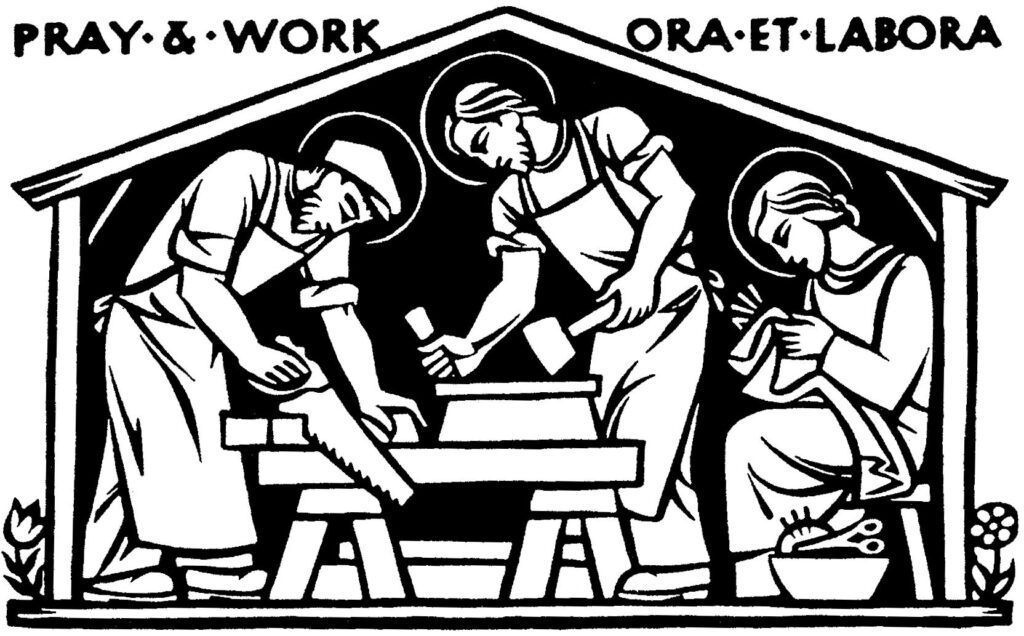
We wrote to you very recently, but just in the past week, an event that the Guild is thrilled to be co-sponsoring came together, and we are so excited to invite you to join us! We also have a few more program updates and newly-published recommendations to share, so keep reading to learn more.
Upcoming events:
We are thrilled to announce that Archbishop John Wester will once again be celebrating a Mass for the Abolition of Nuclear Weapons on Tuesday, March 4th at 6:00 pm. Archbishop Wester is coming to New York for the third meeting of states parties to the Treaty on the Prohibition of Nuclear Weapons, which will take place from March 3rd-7th. The mass, which will be followed by a light reception, will be held at the Church of Our Saviour, 59 Park Ave in Manhattan. The Dorothy Day Guild is honored to be a co-sponsor of this event, along with several other Catholic peace groups in the Northeastern United States. If you would like to attend, please register on our website. We hope you will join us in prayer and action for a world free from nuclear weapons next month!
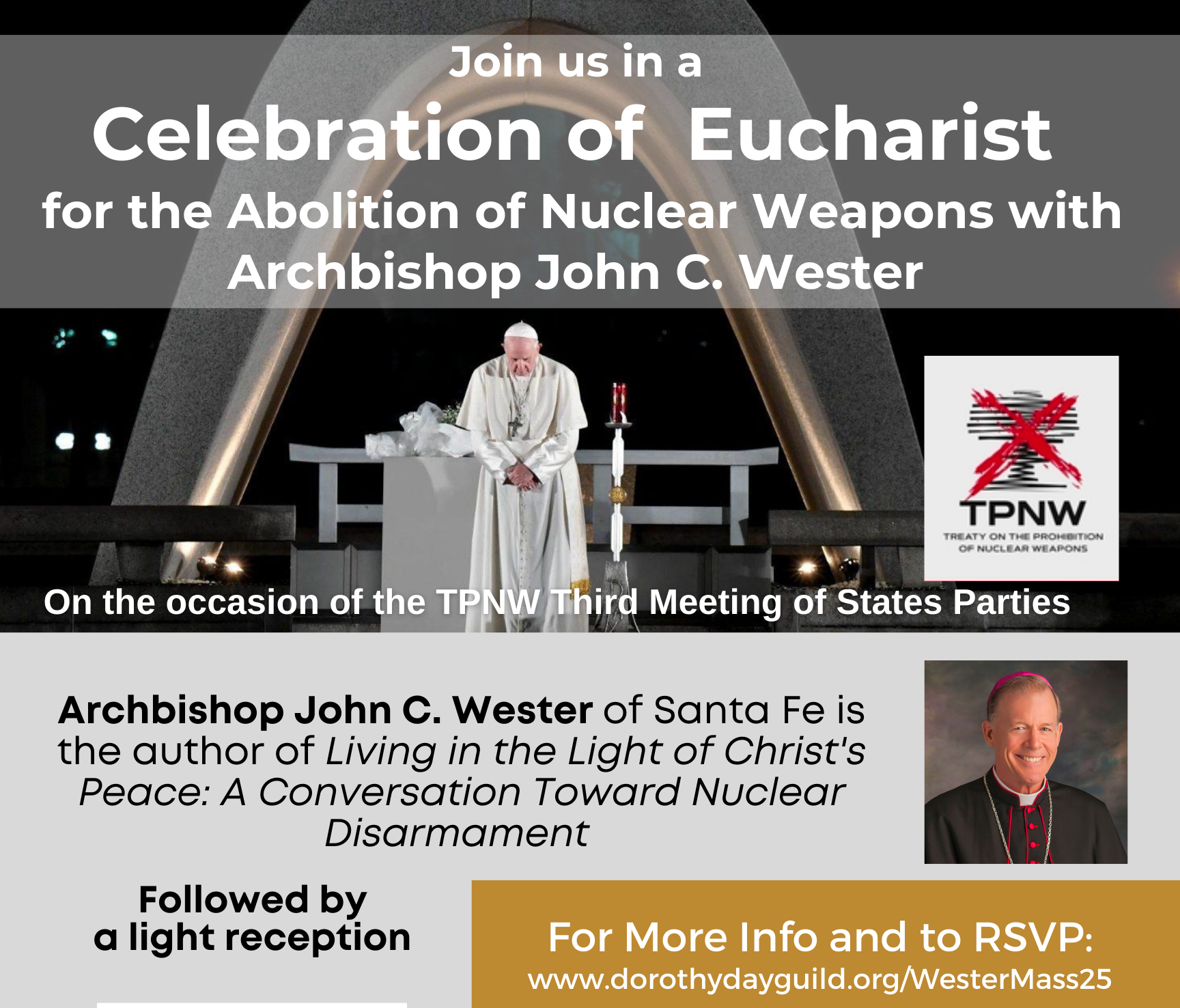
Next week, on Tuesday, February 18th at 7:00 pm, our Guild chair, Dr. Kevin Ahern, will offer a presentation at Sacred Heart Church in Bayside, NY. Kevin’s talk, “Dorothy Day: A Pilgrim of Hope,” will offer insights into Dorothy’s journey of faith, service, and hope, highlighting her profound impact on the Catholic Church and society. This free event includes refreshments!
Sacred Heart is located at 215-35 38th Avenue, Bayside, NY 11361, and anyone who would like to attend is welcome to call the parish office at (718) 428-2200 for more information.
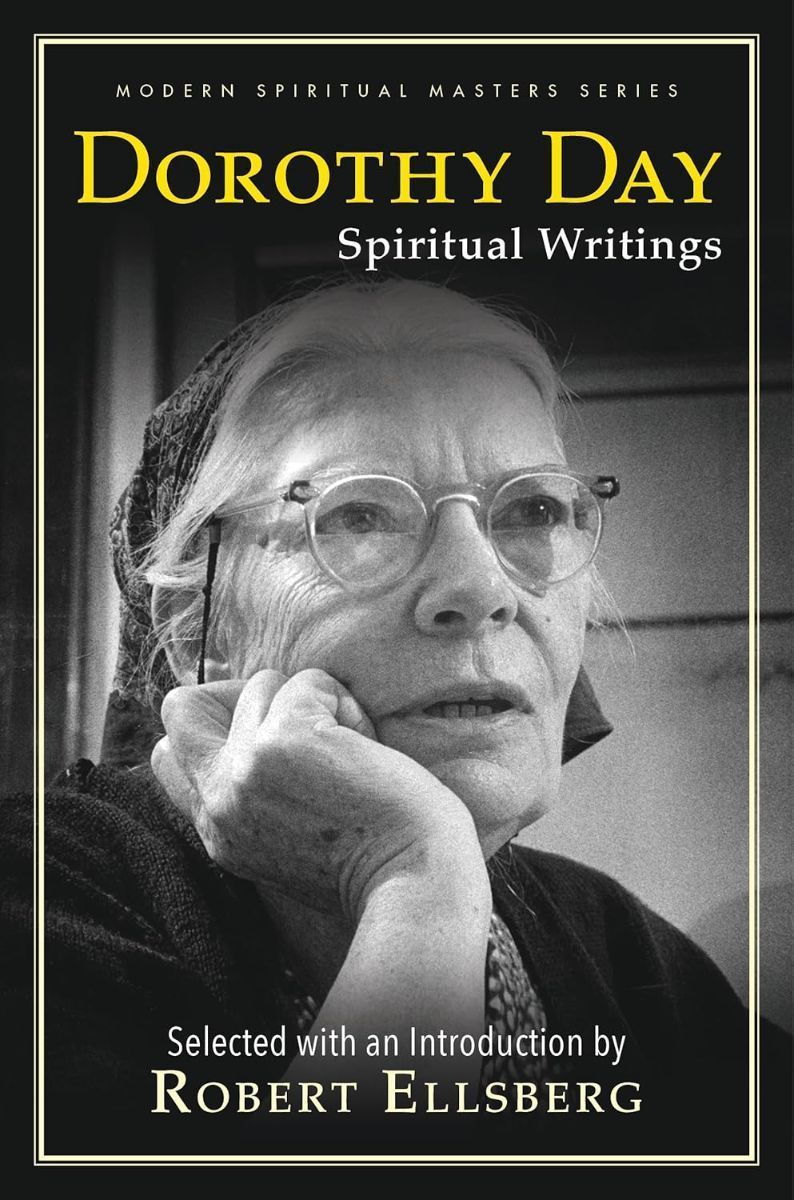
We would also like to remind you that registration is now open for our online Lenten book club, which begins Sunday, March 9th at 7:30 PM Eastern. Over the course of five Sunday evenings, Robert Ellsberg will host our online reading group where we will work through his newest edited volume of Dorothy's work, entitled Dorothy Day: Spiritual Writings, available through Orbis Books.
At the end of next month, Robert will be offering a program for the St. Ignatius 2025 lecture series, “Pilgrims of Hope,” on Monday March 31st at 7:00 PM. Robert’s talk, “The Long Pilgrimage of Dorothy Day,” will reflect on Dorothy’s long life "on pilgrimage," and the way her faith was tested and refined by ordinary life in her community and family and the challenges of her own time and context. St. Ignatius Loyola parish is located at 980 Park Avenue in Manhattan; all lectures in the series are held in Wallace Hall.
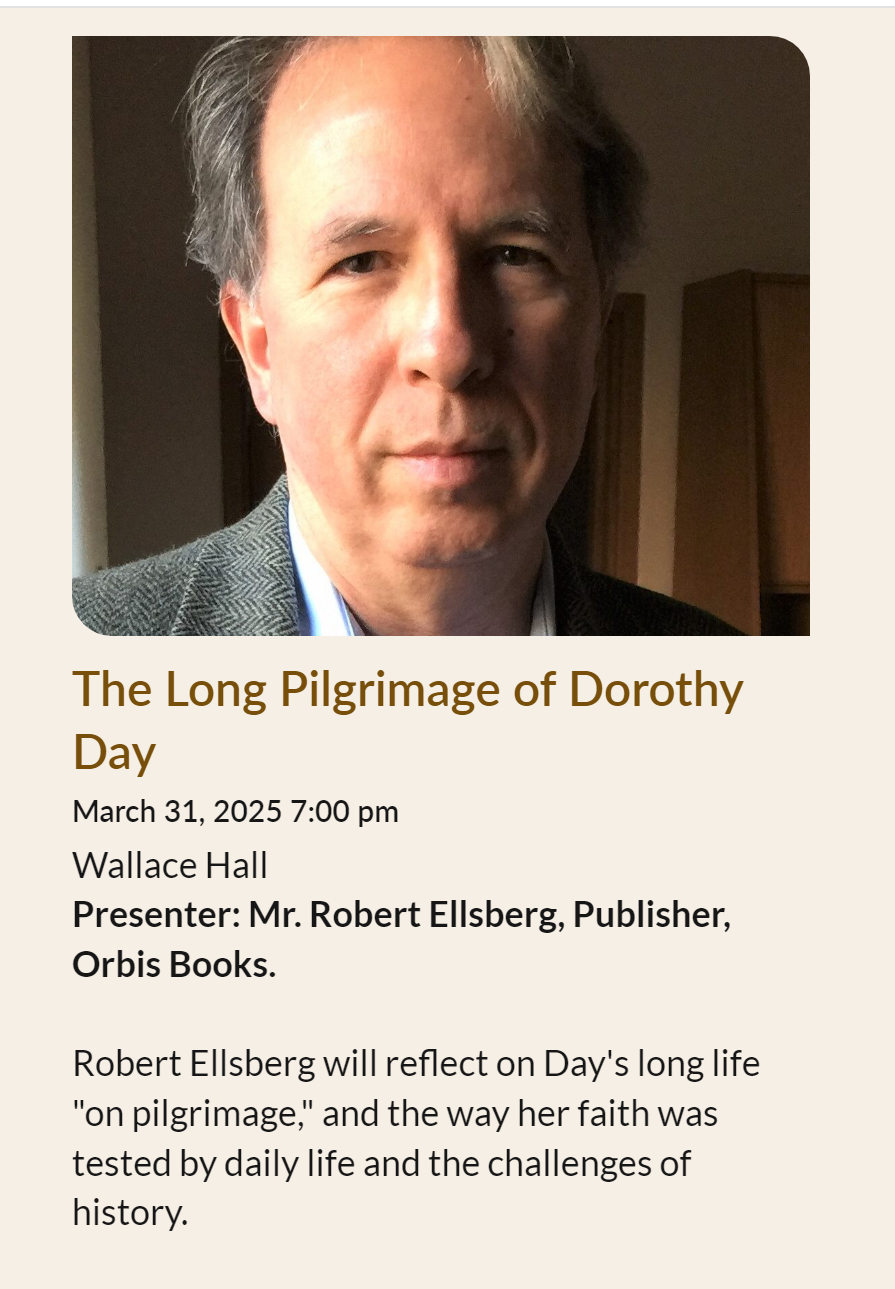
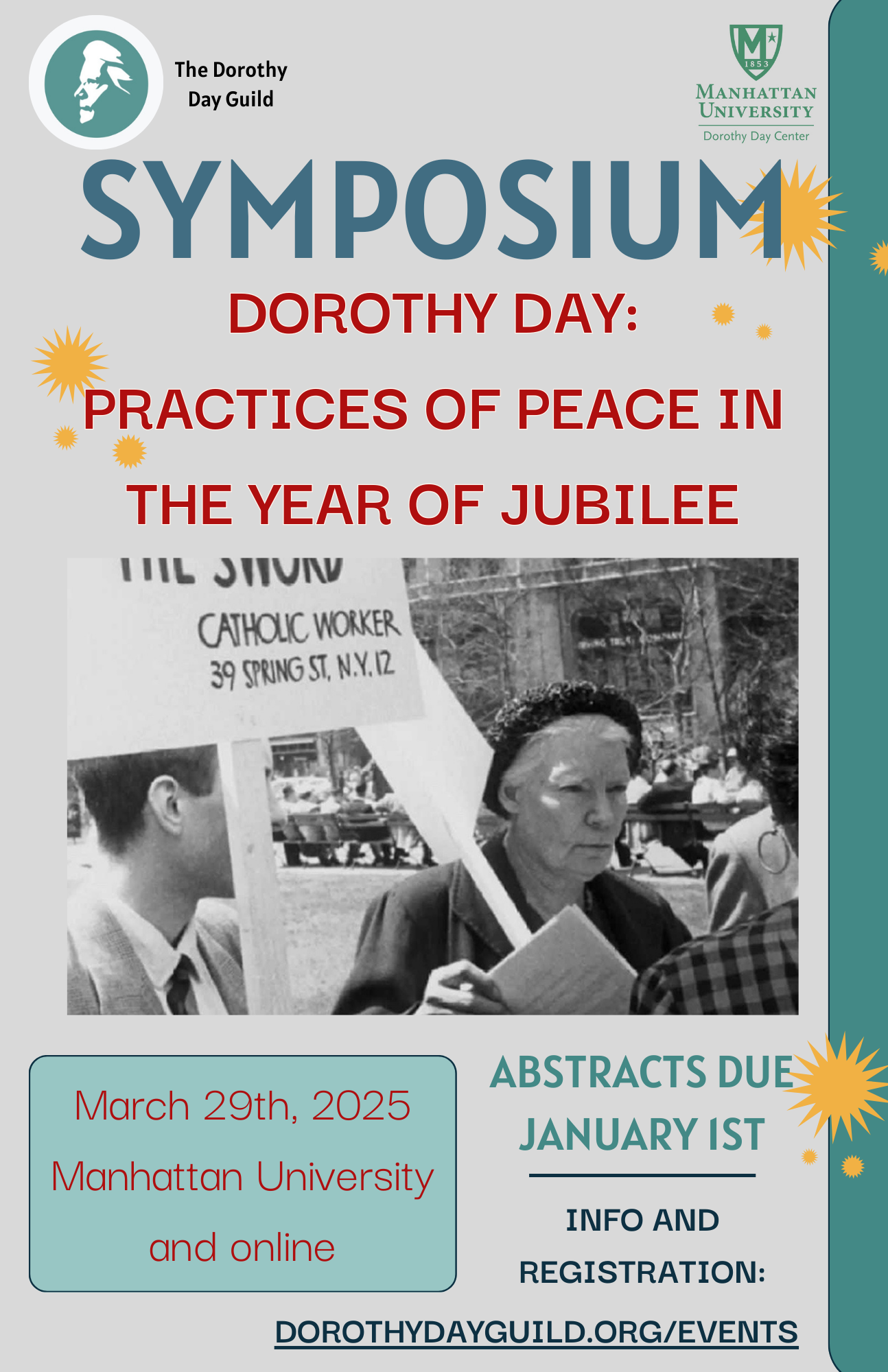
Registration is also open for our upcoming day-long symposium, “Dorothy Day: Practices of Peace in the Year of Jubilee.” This event will take place on Saturday, March 29th from 9:00 AM to 6:00 PM on the campus of Manhattan University in the Bronx and online. We’ll be releasing the schedule of roundtables and other activities later this month, and we are so excited for this opportunity to engage in clarification of thought, prayer, and celebration with you. This is going to be an amazing event, and we hope to see you there!
For those in the Midwest, we would also like to invite you to a special performance of Haunted by God: The Life of Dorothy Day on Friday, April 4th at 7:00 PM Eastern at Our Lady of the Road in South Bend, IN. Our Lady of the Road is the drop-in and community center run by our St. Peter Claver Catholic Worker community and is located at 744 South Main Street in South Bend. All of us at the Guild are so pleased to be co-sponsoring this evening with the support of the South Bend Catholic Worker community and the College of Arts and Letters at the University of Notre Dame. This free event will feature a performance by artist and playwright Lisa Wagner-Carollo and a dessert reception!
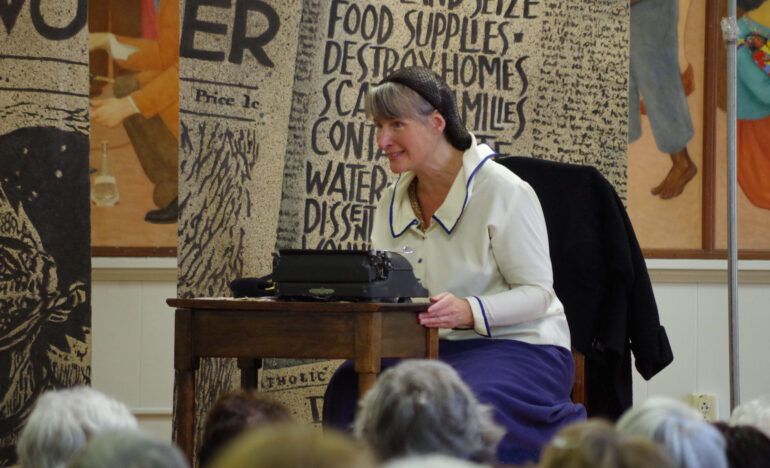
In recognition of Dorothy’s own commitments to voluntary poverty and the knowledge that many of those who are most devoted to living out and sharing Dorothy’s legacy have very limited financial resources themselves, we are very proud to be able to offer all of our Guild events free of charge. If you are in a position to make a donation in support of our programming, we would greatly appreciate your help! We would like to offer our enormous thanks to the many people who have made contributions to the work of the Guild in recent weeks, especially our members and regular monthly supporters. Thank you– your generosity has enabled us to introduce Dorothy’s legacy of Gospel nonviolence, voluntary poverty, and hospitality to thousands of people since the Guild's foundation.
Finally, and looking ahead to the summer, Martha Hennessy will be offering a retreat on Dorothy at Pyramid Life Center in Paradox, NY from July 21st-23rd. Registration is open for this special midweek opportunity for prayer and reflection on the question “How are we called to live life as a Catholic in America?” The retreat overview states,
“One of the 20th Century’s most influential Catholic thinkers, writers, and activists, Dorothy Day, spent a lifetime working to answer that…The retreat will have a special focus on Robert Ellsberg’s new book about Dorothy’s spirituality, and how her spirituality informed how she approached her life and work. This retreat will be facilitated by Martha Hennessy (Dorothy’s Granddaughter) a writer, activist, and fellow Catholic Worker.”
Pyramid Life Center is a beautiful camp located on a pristine lake in the Adirondack Mountains, halfway between Lake George and the High Peaks Wilderness. The Center, which is operated under the auspices of the Roman Catholic Diocese of Albany, offers a number of retreats and programs throughout the summer and fall. My family, along with several other families from our parish, spent most of a week every summer camping and hiking there, and the best memories from my childhood and adolescence are all set there.

I am particularly excited about this upcoming Dorothy Day retreat because it was at Pyramid Life Center that I first encountered the Catholic Worker movement. As a high school student, I worked in the kitchen there during the summer, washing dishes and cooking for retreat guests. The late, beloved retreat director, Sister Monica Murphy, hired teenagers for basic chores and hospitality work during the summers and exhibited a remarkable degree of patience with and trust in our abilities. The summer that I was seventeen, a woman wearing a tee shirt with Dorothy’s image on it handed me her plate at the dish window during lunch. I took it from her and as I went to spray it off and stack it in the rack awaiting the industrial washing machine, I remarked that I knew who Dorothy was and I liked her shirt.
“That’s great!” she told me. “My name is Liza Apper, and I’m a Catholic Worker from Fresno, California.”
I spent the rest of the week finishing work as quickly as possible each night and then bothering Liza and her daughter Francesca with all of my questions about their work and the life of their community. For me, the rest is history: I knew by the end of that week what I wanted out of my life. Seventeen years have passed since then, and I often look back and realize that I owe my entire vocation to that chance encounter in the retreat kitchen.
I cannot encourage you enough to attend the Dorothy Day retreat this summer. Pyramid Life Center is one of the places where Creation is most alive with God’s presence, and Martha’s facilitation and insight into her grandmother’s spirituality is a powerful gift. Who knows– perhaps Dorothy might speak to you as well, and you will also receive or be renewed in your vocation.

Reading and listening recommendations for February:
Last month, on my way back to South Bend from New York, I stopped very briefly at Kevin Ahern’s home right before he had to jump back inside to record a new episode of the Deacons Pod. Kevin has been a guest on the podcast before, but this time, he interviewed author Jeff Korgen and illustrator Christopher Cardinale on the new biography they published last fall, Dorothy Day: Radical Devotion. This conversation explores the collaborative process that Jeff and Christopher undertook to create the scenes depicted in the book, including visits to the Dorothy Day/Catholic Worker archives at Marquette University and research with Dorothy’s (extensive) FBI file. Later in the episode, Jeff and Christopher also talk about the possibilities for storytelling through visual media and Kevin considers how Dorothy embodies the vision of holiness Pope Francis outlined for us in
Gaudate et Exultate. Thanks to the Deacons Pod for hosting this discussion, and thank you, Kevin, for providing coffee for the traveling crew of Catholic Workers mere minutes before this great interview!
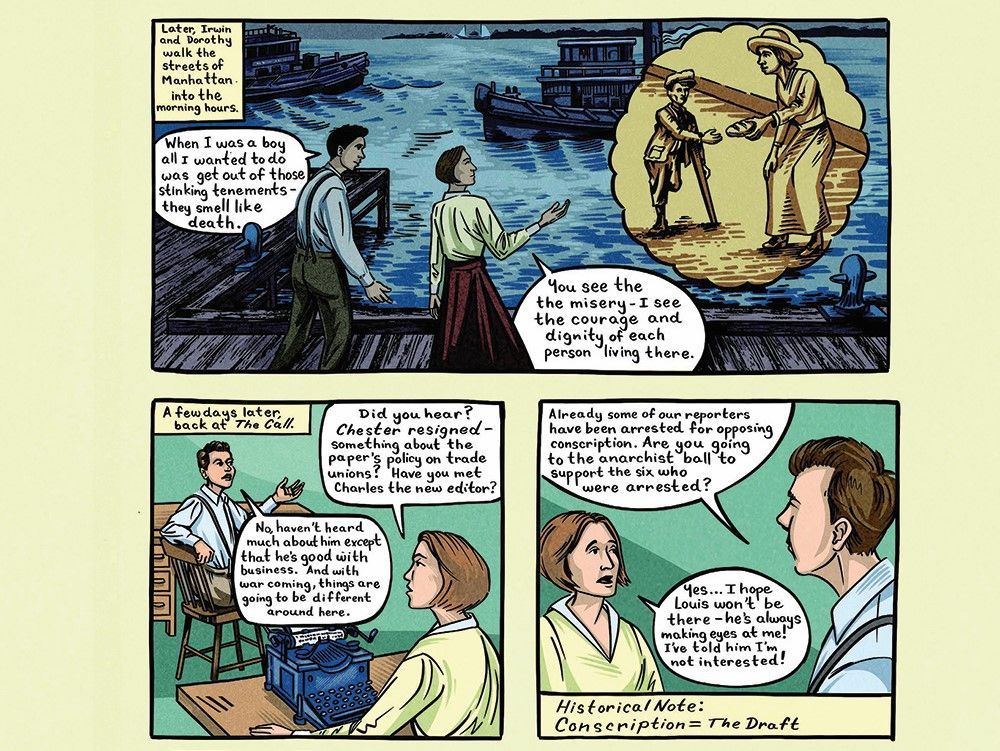
Also from the end of January, Renée Roden published a piece on aesthetics and the Catholic imagination for US Catholic. Renée’s article, “Who gets to define beauty in the Catholic Church?” was occasioned by the removal of an icon of Christ from the St. Joseph’s Apache Mission parish on the Mescalero Apache reservation in New Mexico.
The icon, which has since been restored, depicts Jesus in traditional Apache clothing; however, the unilateral removal and non-response from the diocese has both saddened parishioners and prompted reflection over the role of beauty in leading us back to God, a topic which was always close to Dorothy’s heart. Renée writes, “Saints throughout history have challenged the traditional alignment of beauty with wealth or treasure. Like Christ, they found beauty in the poor, in the people society discards.”

Dorothy was fond of quoting Dostoyevsky’s famous line from The Idiot, “The world will be saved by beauty.” However, Dorothy not only saw beauty in the poor, where many only see the scars left by rough treatment and destitution; she also knew that God made beauty for the poor. Reflecting on the appropriateness of the stunning Apache Christ icon for the worshippers at a mission parish in one of the poorest regions of the United States, Renée recounts the famous story of Dorothy freely giving a donated diamond ring to a homeless woman. “It was a sign of [Dorothy’s] respect for the woman’s dignity to allow her to do what she liked with the ring: sell it—or keep and enjoy it,” Renée explains. Beauty is a sign of God’s immense love for us and desire to draw us ever closer to Him. Dorothy understood that God created the beautiful things of this world for all of us, not for the exclusive enjoyment of the wealthy.
For the most recent edition of the Houston Catholic Worker, Michael Baxter wrote “Living Beyond Politics: A Post-Election Reflection On Dorothy Day,” a timely piece that considers the current political moment in the United States “in the light of eternity.” Now, when many people in the United States and elsewhere feel anxious and helpless, Dorothy’s mode of engagement with the political order provides a counter-narrative to the common, incessant insistence that our vote in November will decide “the most important election of our time.”
Having worked as a journalist in a significantly more diverse media landscape than what exists today, Dorothy was familiar with the cycles of discourse around electoral politics. Ultimately, Dorothy took little interest in what she found to be shallow and impoverished understanding of the human person’s relation to and responsibility for the political order and the common good. “Instead,” Michael writes,
“she sided with the radicals of the Industrial Workers of the World, the IWW or ‘Wobblies,’ who opted for direct action to establish the revolutionary society here and now. For Dorothy, this direct-action approach was the most concrete, practical way to fight injustice and forge genuine community.
In short, Dorothy was an anarchist. And not only in her youthful pre-conversion days of the Old Left. She remained an anarchist after her conversion and entry into the Church. Not a bomb-throwing anarchist bent on tearing down society through revolutionary violence, of course. She had become enamored with the Christ of the gospels, teaching us to love our enemies, walking the way of the nonviolent cross, and bestowing on the apostles His gift of peace. She was a Christian, indeed a Catholic anarchist.”
Dorothy’s vision of a truly personalist mode of engagement with the political order, one which took seriously the dignity of the human person with both needs and agency in the context of her community, is essentially reconstructive. Continuing intellectual formation on justice and the common good through reading and discussion is important, but it should empower, rather than paralyze us. As Michael reminds us, Dorothy and Peter understood radicalism to mean more than simple opposition to the State. Radicalism also required “going down to the roots of society and taking personal responsibility for social change. This called for translating love into action, which in turn required community. The idea was to forego the politics of the nation-state in order to pursue local forms of community-based work.” We certainly have work to do in service of building a new society in the shell of the old; Dorothy’s anarchist commitments equip us with the skills and perspective needed to take up this responsibility.
For the Winter-Spring 2025 edition ofThe Sower, the publication of the Strangers and Guests Catholic Worker farm, Brian Terrell wrote “Permanent Dissatisfaction: Dorothy Day and Making Sense of Being Catholic in this Jubilee Year.” Here, Brian considers loving responsibility as the cornerstone of Dorothy’s self-understanding as a Catholic Christian. Dorothy loved the Church as the visible manifestation of Christ’s Mystical Body, and found her home within its embrace, yet she was critical of its institutional failures to take a firm stance for the Gospel of peace and consistently honor the face of Christ in the poor. Brian writes,
“Dorothy offers dissatisfaction not as an acceptable option for some, but as an imperative. One must be dissatisfied with it, or one does not really love the Church at all.
As with any other love—filial, romantic or patriotic—love for the Church requires honest appraisal of the loved one’s faults and sins, otherwise it is not love, but simply an unhealthy attachment disorder. It was in love that Dorothy could call out and name the “worst enemies” without expelling them from her “household” or leaving it herself.
The choice today is even clearer. We know more now. We can choose to leave the Church as Ignazio Silone did or we can stay with it, permanently dissatisfied, as Romano Guardini and Dorothy Day chose, but to remain in it happy and comfortable, complacent and blind to its many scandals, is not a moral choice at all.”
Dorothy often found herself in a similar position to the prophets of Israel, charged with calling the people back to their original vocation as God’s covenant partners. This “critique from within” is never offered in a spirit of rejection or condemnation, but always from a firm assuredness of God’s mercy and the certainty that God’s invitation to become co-creators of justice with Him is simultaneously cross and grace.
Last spring, we shared news of a group of student peace activists who were arrested on the campus of the University of Notre Dame following a request for the school to cut ties with weapons manufacturing companies who were supplying arms to the United States and Israeli militaries. Many of the student organizers cited Dorothy as an inspiration for their protest.
This is not the first time that the University of Notre Dame has been a site of significant Catholic antiwar action. In The Revealer, David Griffith recently published “Against War: The Mysterious Death of Student Protestor, Timothy MacCarry,” an extensively-researched exploration of the spiritual and intellectual formation of a young Catholic activist who organized the Notre Dame and South Bend community against the war in Vietnam and was found dead only a few months after graduation.
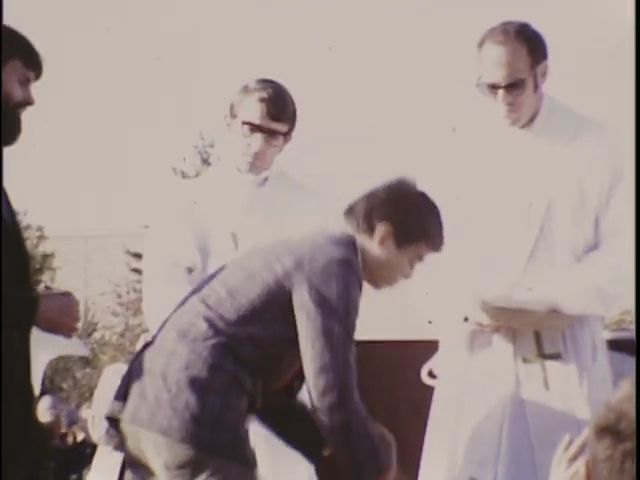
Timothy MacCarry, pictured here tearing up his draft card and placing it on the altar at an on-campus resistance mass in October of 1969, had ties to the Catholic Worker movement, contributing columns to the paper, spending time visiting Dorothy at the Catholic Worker farm in Tivoli, NY, and even helping found a short-lived Catholic Worker experiment in South Bend, which he and his community members named St. Francis House. Upon learning of his death, Dorothy wrote to Tim’s father to express her sadness and disbelief, saying that “no one can accept the coroner’s ruling of a ‘suicide.’”
In this piece, David connects Tim’s antiwar resistance to the development of the Program for the Study and Practice of Nonviolence at the University of Notre Dame during the Vietnam era and to the present work of student activists who are currently organizing against the Palestinian genocide.
David spoke with Father Emmanuel Charles McCarthy, founder of the Nonviolence Program and a close friend and advisor to Tim, for this piece and asked what he would tell the students who are following in the footsteps of a previous generation of Catholic war resisters. Fr. McCarthy replied,
“I would tell them your basic Christianity is correct—you are thinking in terms of the Gospel. What’s going on in Gaza deserves total condemnation, and not just because Jesus said it, but the question is how do you witness so that other people can see [the injustice], too? Witnessing such that others cannot see is no good. Unless you do serious education in Gospel informed non-violence, you’re not going to make a dent.”
David and his family likewise have ties to the Catholic Worker movement here in South Bend, where our community has been following this case closely. He and his son Alexander Day (who was named for Dorothy) helped us cook for the nonviolence retreat the St. Peter Claver Catholic Worker community hosted for the student activists over the summer, and his daughter Charlotte was a regular volunteer in our houses of hospitality before leaving for college last fall. We look forward to reading the next installment of David’s work on this topic and ask your continued prayers for the seventeen students who were arrested in May and who still have pending legal cases.
As Dorothy becomes a more and more familiar figure in the American Catholic Church, the global Church, and in secular circles which share her commitments to nonviolence and care for the vulnerable, it has been interesting to see the increasing frequency with which selections from her diaries, letters, and other writings spark short piece, like this one, from Lawain McNeil’s Substack, “The Call to Holiness.” Here, McNeil reflections on a quotation found in The Reckless Way of Love: Notes on Following Jesus, originally from one of Dorothy’s letters:
“The main thing is never to get discouraged at the slowness of people or results. People may not be articulate or active, but even so, we do not ever know the results, or the effect on souls. That is not for us to know. We can only go ahead and work with happiness at what God sends us to do.”
In her words, McNeil reads a challenge to our cultural addiction to immediate gratification and our unwillingness to wait for God’s timing. The sense of impatience that Dorothy recognized in her own time has perhaps only grown more pronounced in ours, when we are troubled by uncertainty and doubts about the future, but the response she advises remains the same: trust in God, continue to labor for the common good and a more just social order, and never cease to recognize the face of Christ in
The Guild keeps a record of the many ways people are currently drawing from Dorothy’s legacy and writing, whether that be through high school or university syllabi, books and articles, visual and performance art, homilies, and even short blog or Substack posts like the above. This is part of how the Guild can support the official work of our postulator and relator at the Vatican on Dorothy’s canonization cause– the diverse forms and sources of engagement demonstrate widespread devotion to and recognition of Dorothy as a holy figure worthy of imitation. If you come across something that we’ve missed, please reach out and let us know!
Finally, we mentioned last month that the Dorothy Day Guild is now offering regular opportunities to participate in our walking pilgrimage through lower Manhattan. Earlier this winter, journalist Valerie Stivers took us up on this invitation and wrote a piece on the pilgrimage for Our Sunday Visitor, “Living the Gospel on the streets of Dorothy Day’s New York.” Stivers notes that Dorothy’s legacy has an enduring power which has outlasted many of the physical structures mentioned in Dorothy’s early books and letters. “Most addresses on the tour,” Stivers writes, “lead to locations where the original buildings have been demolished — a situation that ironically reveals Day’s strength and spirit better than a landmark building might.”
Stivers also spoke with several Catholic Workers from the greater New York City area, including our friend Deborah Susich, who recently founded a new Catholic Worker community on Staten Island. Deborah told Stivers that bringing the Catholic Worker back to the borough where Dorothy first felt powerfully drawn to God was a way of honoring Dorothy’s legacy, which has informed her own vocation. Speaking on the call she feels to serve the poor as Dorothy did, Deborah explains in the article that she was attracted to Dorothy’s profound Catholic faith and ‘the spirituality behind the [Catholic Worker] movement… It’s really about the spiritual and corporal acts of mercy; it attempts to live out the Gospel in a more radical way.’”
It has been great to learn of the reflections and continuing invitations to discernment and service that this pilgrimage is inspiring. As we move into the Lenten season, when the whole Church goes on pilgrimage together, we hope that many of you will come walk with Dorothy, and with us.
Prayer requests:
We have a few prayer requests to share with you this month, including one new and one ongoing need for intercession. We recently learned of a new Catholic Worker community in France, Maria Skobtsova House in Calais. The members of this community offer “sanctuary and hospitality to vulnerable refugees, in the spirit of Dorothy Day, founder of the Catholic Worker Movement, and Maria Skobtsova, ‘Saint Mary of Paris’.” The presence of the Maria Skobtsova House community among the newly-arrived migrants, many of whom are women and children fleeing unspeakable violence in Sudan, Eritrea, and Syria, was described in a recent post for the Passio Project, “Winter at the Border.” As many cities in the United States and western Europe become increasingly hostile to refugees and asylum seekers, please join us in asking Dorothy’s intercession for this vital offering of hospitality.
In Boston, Martha Hennessy reports that her granddaughter, Adelyn Tamar (Dorothy’s great-great-granddaughter!), is showing signs of improvement, but still needs to remain in the hospital. Please continue to pray for a full recovery for Adelyn and for the comfort and sustenance of her loved ones, especially her mother and grandmother.
Finally, we ask your prayers for Maria, of Kalamazoo, Michigan, who is in need of a miraculous healing. Maria’s family has strong connections to the Catholic Worker movement and a deep devotion to Dorothy. Please hold Maria and the many people who love her in prayer and ask that Dorothy bring this urgent request to God.
Asking Dorothy’s intercession for the needs of those we love is one of the most significant ways that friends and members of the Guild can support her canonization cause. We know that we do not exhaust God with these requests. God sees and anticipates our needs, and while He might have chosen to accomplish the salvation of the world by any number of means, through the establishment of the Mystical Body of Christ, God has chosen to make us partners in the redemption of creation. As members of the Mystical Body, we take up our small portion of this responsibility through the performance of the works of mercy, one of which is prayer for the living and the dead. With Dorothy, we continue to offer this spiritual work of mercy for the needs of the world.

A few words from Dorothy:
My undergraduate class this semester just finished reading Dorothy’s From Union Square to Rome, and has now moved on to a study of Fr. Dan Berrigan’s writings from No Bars to Manhood and elsewhere. Last week, when we watched the footage of the Catonsville 9 draft board raid and read their trial statement, we also examined Dorothy’s stance on conscription, war, and the imago Dei. In January of 1943, a time when up to 200,000 men were being drafted into the United States military each month and the groundwork for the Selective Service conscription program which continues to this day had already been established, Dorothy published her statement, “If Conscription Comes for Women,” on the front page of the paper. She writes,
“I will not register for conscription, if conscription comes for women, nor will I make a statement to the government on registration day as to my stand, lest this be used as involuntary registration on my part. Instead, I publish my statement here, my declaration of purpose, and if it encourages other women not to register, I shall be glad at such increase in our numbers
I shall not register because I believe modern war to be murder, incompatible with a religion of love. I shall not register because registration is the first step towards conscription, and I agree with Cardinal Gasparri, that the only way to do away with war is to do away with conscription.”
Dorothy goes on to discuss the draft through the lens of English Catholic philosopher E.I. Watkins, who asserted the practical and spiritual force of mass resistance to conscription as well as the family’s right to integrity as a higher value than the State’s need for forced labor. She cites Watkins and makes a claim from her own position as a mother and an independent moral thinker:
“‘The family,’ Watkins continues, ‘is a society prior in value to the state, on whose natural right the state may not without usurpation encroach.’ And it is as a most important part in that family, as a woman whose function it is to bring life into the world rather than to destroy life, that I make this protest…
This is total war, and that means every man, woman and child, possessed, heart and mind, body and soul, by the state.
But why object to registering? Why not register and then refuse if your number is called?”
By little and by little we must resist. Why take the first step if we do not intend to go on? Why count on exemption because of work of national importance and so lose the opportunity to testify to the truth that we feel so strongly?
‘Mary and Joseph went to Bethlehem to register.’ I have heard the specious argument. But it was not so that St. Joseph could be drafted into the Roman army, and so that the Blessed Mother could put the Holy Child into a day nursery and go to work in an ammunition plant.
‘Render to Caesar the things which are Caesar’s.’ Yes, and we have heard too much of that.”
In this column, Dorothy reminds us of an essential truth of the Catholic faith: our lives, and the lives of our children, are not the coinage of the empire. We are not stamped with the image of Caesar; body and soul, the human person is stamped with the image of God.

It should not surprise us that in this issue of the paper, Dorothy chose to pair her editorial with one of Peter’s Easy Essays, “Things that are God’s.” Peter tells us that the forces of empire are never satisfied with taking the things which belong to Caesar; in their greed, they reach for the things which belong to God. “The child does not belong to the state; it belongs to the parents,” Peter tells us. “The child was given by God to the parents; he was not given by God to the state. The parents must teach the child to serve God from whom they received the child.”
He goes on to remind his listeners that passive acceptance of conscription is a dereliction of the sacred charge with which God entrusts parents when they welcome a new child into the world. “When the parents allow the state to grab the child and to act toward the child as if God did not matter, they lose their claim to the allegiance of the child,” Peter says. “The Nazi Caesar claims that there are superior races and inferior races… There are no superior races; God is not a racial God but the Father of all races and the Creator of all; Christ loved and died for all: We follow Him and we want no Caesars.”
As bearers of the divine image, we are each imbued with an inalienable dignity and interior freedom. That freedom, and the recognition of our own dignity, and the equal dignity of our brothers and sisters, should cause us to reject cooperation with and participation in any act which tarnishes God’s image. We must not kill, we must not participate in killing, and we must not allow our universities or our nation to sponsor killing on our behalf. We are members of one Body. Dorothy calls on us, over and over again, to resist any form of violence which denies our ultimate belonging to one another, and to Christ.
In peace,
Dr. Casey Mullaney, on behalf of the Dorothy Day Guild
Share this post





